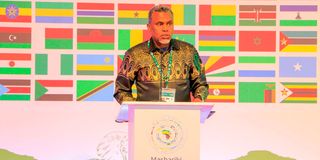Premium
Foreign policy big headache for Africa spy chiefs

National Intelligence Service Director General Noordin Haji delivers his speech during the second Mashariki Cooperation Conference he held in Naivasha, Nakuru County on April 3, 2025.
The wider eastern African region has traditionally had its problems: wars, violent extremism, coups and teeming masses of the displaced.
Now, Kenya thinks a common thread can weave a solution to all: placing intelligence agencies to the front and back of the problem. Yet intelligence chiefs are now learning they have to play diplomacy, bureaucracy and manoeuvre the perceptions from the public.
Kenya’s proposal emerged last week at a conference of security-related policies in Naivasha, where intelligence chiefs from across the continent and beyond gathered to pore over these problems.
It wasn’t the first time countries were gathering to discuss common challenges. In fact, Mashariki Cooperation Conference, as the event was labelled was already in its second edition, the first having been held in Mombasa last year in January.
Some intelligence experts from 60 countries attended including from Somalia, Ethiopia, Uganda, Rwanda, Zambia and Nigeria.
Yet the history of intelligence chiefs in Africa, in general, has been controversial, often seen as whips for the state to target the dissent and clean the political streets for the government.
In Naivasha, last week, they were discussing climate change, violent extremism, resource exploitation by external agencies and how conflict in one country has planted explosive seeds for the extremists. Then there was the dilemma on digital freedoms, social media and artificial intelligence.
Also Read: NIS: Who watches the watchmen?
“Proliferation of misinformation and disinformation campaigns exacerbated by the use of AI-generated content has waged a war against truth with governments being the biggest target,” said Noordin Haji, Kenya’s Director-General for the National Intelligence Service (NIS).
Social media the villain
In Kenya, as in several other countries in the region, social media was often seen as tool to spread information to the public. But authorities have also routinely restricted it, often blaming it for the spread of inaccurate information including conspiracy theories.
At the conference, experts discussed whether the conundrum around digital platforms will be an enduring problem, just a blip or balloon into something bigger.
Critics see any restrictions as a violation of free speech. Mr Haji, though, was quick to add that concerns about misinformation should not be seen as a bid to curtail free expression.
“This is not to be confused with us trying to muzzle free speech and the freedom of speech at all. We are talking about fake news, misinformation, disinformation; the sum of which will end up making the citizens making decisions that are ill informed thereby bringing bring insecurity in our regions and the continent.”
It is a sentiment President William Ruto has taken before. At Jamhuri Day celebrations last year, he argued Kenya could be both a victim and beneficiary of emerging tech.
“We are at the stage in social development when digital technologies have immense capacity to amplify disinformation, magnify fake news and distort facts beyond all recognition,” he said.
“If we give in to these emerging negative trends, we shall pay with our freedom, democracy and development.”
At the time, Kenya had just emerged from strong Gen-Z protests, followed by mysterious abductions of those activists. In Naivasha, President Ruto repeated the argument that social media could be weaponised to become breeding grounds for insecurity.
But experts admitted that growing gaps in information sharing, lack of synergy in laws on dealing with misinformation as well as absence of mutual legal assistance was fuelling transnational crimes. In this region, for example, countries can’t agree what amounts to incitement, terrorism or generally, fake news.
“How do we address the problem that what is illegal here is lawful in another country? We must critically look at issues of mutual interest so that we can find common ground in which all of us can be assisted by this collaboration,” argued one delegate from Zambia during a plenary session.
"His argument was that sometimes they identify inciting information on social media platforms, but then those platforms refuse to delete the information because it is not an illegality where they are hosted.
For that, intelligence chiefs have had to endure criticism that they are just reactive. They are also yet to establish formal channels of intelligence sharing across the region, which limits faster sharing of warning systems.
Traditionally, attaches have been posted to diplomatic missions, but that also posed two problems: suspicions and absence of diplomatic outposts.





